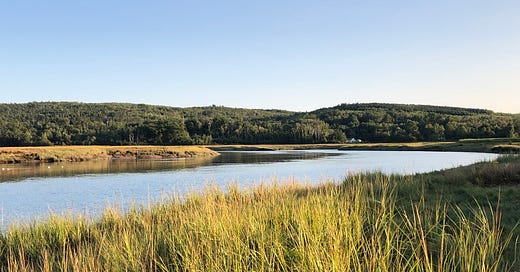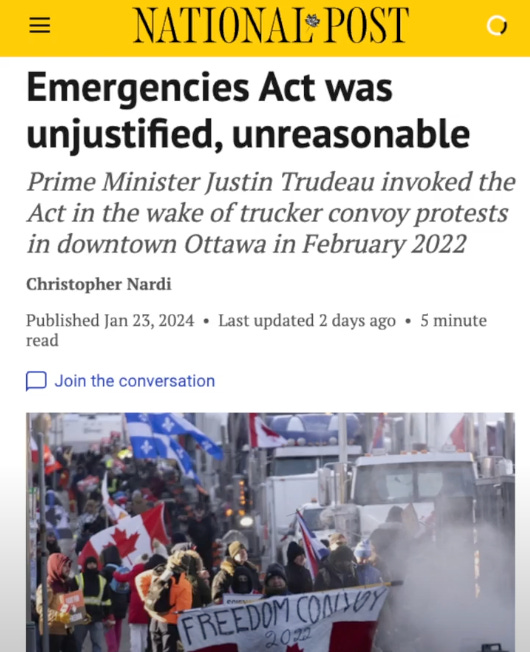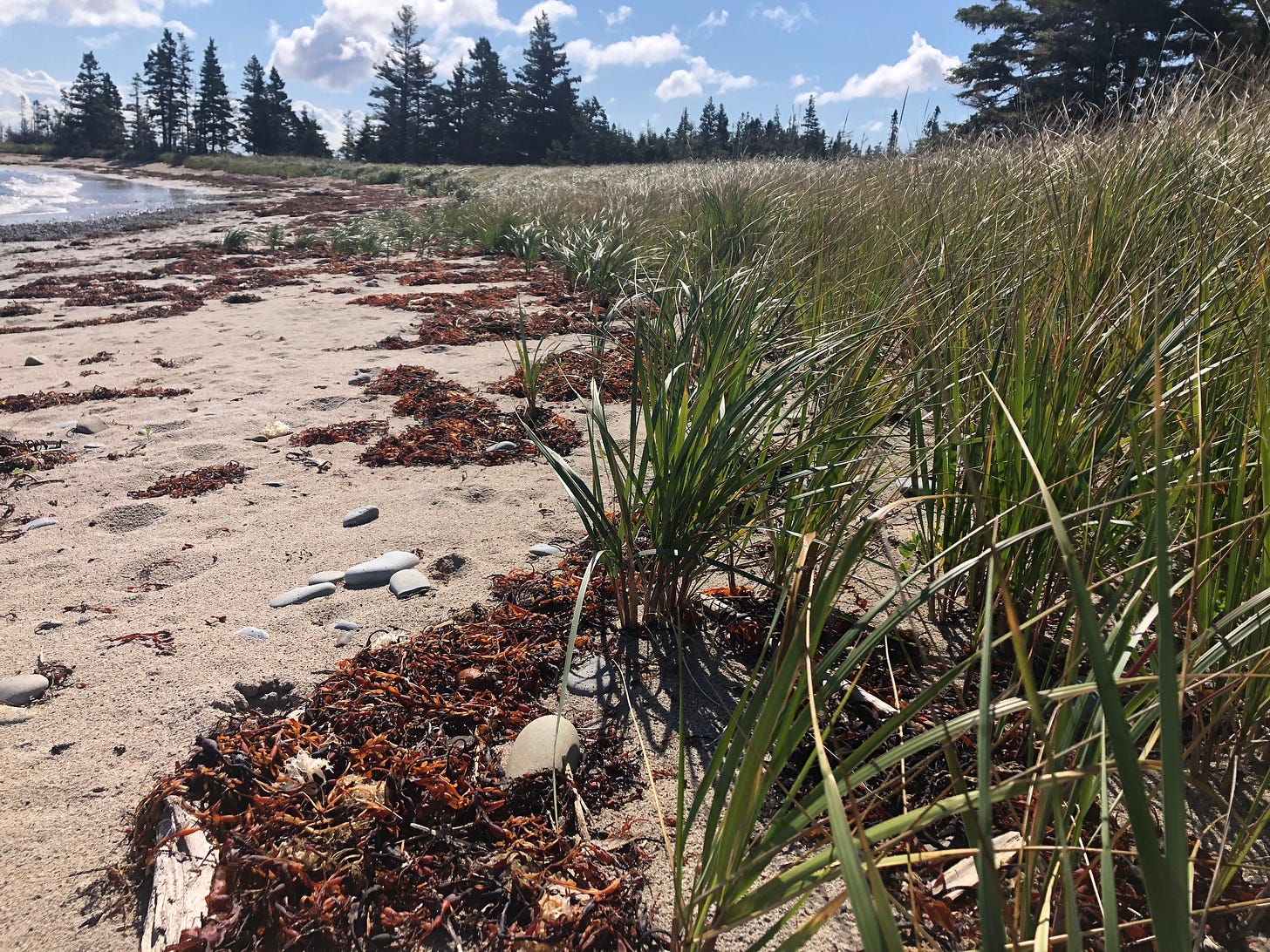Updates on Wetlands and Civil Liberties and a Reminder about What's Coming Up
Allains River Marsh, Annapolis Royal, Nova Scotia. Photo: Linda Pannozzo.
Freedom of Information and the Changes to the Interpretation of the Wetlands Conservation Policy
As I’ve previously reported, here, here, and here, there is now a “new interpretation” of the Wetland Conservation Policy, which not only violates the original policy, but has functionally delisted potentially thousands of hectares of Wetlands of Special Significance (WSS) in Nova Scotia.
We know based on a leaked memo, that wetlands of special significance designation no longer considers species that are listed as vulnerable or special concern. The new interpretation instructs that only a portion of the wetland that directly supports an endangered or threatened species at risk is to be designated WSS. Furthermore, another huge departure from the original interpretation of the policy, only the part of the wetland that overlaps (or exists within) with the designated area is WSS and therefore protected.
As I reported here, nine environmental groups, including the Ecology Action Centre, East Coast Environmental Law, Nature Nova Scotia, and the Atlantic Salmon Federation released a joint statement denouncing the downgrading of the policy.
Since my last report on this, I filed another Freedom of Information request, in an attempt to find out more about what could behind this highly undemocratic policy shift. I extended the timeline by several months, asking specifically for emails pertaining to Wetlands of Special Significance sent by Lori Skaine (Executive in the Office of Regulatory Affairs), Andrew Murphy (Executive Director, Sustainability and Applied Sciences), or Elizabeth Kennedy (Director of Water Branch at the time) to any staff in the Department of Environment and Climate Change.
The results of the request are a bit lackluster, mainly because of all the redactions, which are, as per usual, strategically located to hide the most revealing bits of information.
But there are a few things I can report.
An August 16, 2023 email from Skaine to Murphy and others, indicates discussions were underway within the department of environment about the “interpretation” of the wetland policy. Skaine also lays out a new procedure whereby when an application for wetland alteration is received, “and prior to any decision being made to deny a wetland alteration based on it being a wetland of special significance, we are requesting this decision be elevated to Executive Directors… for further discussion.”
In a meeting scheduled for May 2, 2023, at the request of Murphy, the wetlands team was to present to staff within the environment department on “current policy/ procedures/ rationale/ purpose around the definition of WSS and the decisions” made based on them.
In another email to Glen Warner (Project Lead), Kennedy says, “We have been requested to attend [a meeting] with an overview of the wetlands policy/ approvals and how it intersects with government’s growth agenda.” Kennedy asked Warner to provide her with how many appeals there have been for wetland alteration approval decisions in the past 24 months, and how many of those were declined.
Warner came back with the following:
In 2021 and 2022 there were no wetland appeals; Previous to that, there was one wetland alteration application rejection appealed was in 2017; and two wetland alteration rejections, one in 2015 (boat launch) and another in 2016 (infill/contaminated site). In 2022/2023, there were 4 wetland appeals; three were dismissed by the Minister. WSS noted as the key reasons. The watercourse alteration appeal was also dismissed because it was not conforming to the Policy on infills.
So a marked increase [in appeals] since 2017. I suspect this is due to the balance of historically developable land has diminished and marginal land remains.
It’s not clear to me who this presentation was intended for. The FOI documents only say “EPC” and when I asked NSECC media spokesperson, Lorena Casales what EPC was an acronym for, all she would say is that it’s “ECC staff.”
One topic that came up at this meeting — and appears to have been discussed at length — is “necessary public function”(NPF).
The presentation notes that the current Wetland Conservation Policy states there would be “no loss in Wetlands of Special Significance (WSS) except: 1) alterations that are required to maintain, restore, or enhance a WSS; or 2) alterations deemed to provide necessary public function, based on an Environmental assessment (if required) with public review or other approvals (eg. Wetland Alteration Approval) as appropriate.”
In the presentation, NPF was defined as:
“A service, utility, role or capacity deemed essential to Nova Scotians. Such functions involve projects that provide public service on a provincial scale. They include public transportation projects, public infrastructure, linear pipeline or transportation corridors or electrical supply infrastructure, projects necessary for public safety and the protection of adjacent properties and infrastructure and land transactions authorized through an Order of Executive Council.”
A lengthy section of the presentation, including the discussion about NPF was redacted.
However, we now know, that definition of NPF was eventually changed. The new definition appeared in September 2023 to include “housing, commercial/ industrial, renewables, etc.” I reported on it here.
According to the most recent documents obtained through FOI, about five months before this (May 2023) presentation, another meeting took place in December 2022, one that may or may not have anything to do with the change in the interpretation, or the change in the definition of NPF. Nevertheless, it is worth noting here.
The meeting was between environment department wetlands team and representatives from the Municipality of East Hants (MEH), who were planning a phased expansion of the Elmsdale business park.
According to the FOI documents, the briefing notes to the Minister and Deputy Minister of Environment were titled: “Elmsdale Business Park - Municipality of East Hands — Wetlands.”
Under the heading, “Current situation/ issue,” everything was redacted.
But a timeline was provided, that indicated that dating back to 2019, the Municipality of East Hants (MEH) had an active Environmental Assessment Registration for wetland alteration over 2 hectares in the Elmsdale Business Park area. In April 2019 the EA Branch requested additional information with no response from MEH and sometime later the MEH withdrew from the EA process and an application process began again in 2022 with an application from a 3rd party [Coastal Cuts], who, according to MEH media spokesperson, was a potential purchaser of one of the lots in the business park.
When the department received the Wetland Alteration Application from Coastal Cuts, its wetland specialist indicated the presence of black ash in the wetland complex. Black ash is listed as threatened, and is of high cultural significance to the Mi’kmaq. It is dependent on the wetland complex for survival. As a result, the entire wetland complex area would be considered a [wetland of special significance] WSS, and, based on the stated Wetland Conservation Policy at that time, could not be altered, according to wetlands specialists.
The wetland alteration application was rejected. The designation of the wetlands adjacent to the Elmsdale business park as WSS would clearly have an impact on the lands owned by the Municipality of East Hants (MEH), and hence a meeting between MEH and department of environment staff followed.
Clearly, the WSS designation was standing in the way of the business park expansion plans.
While it’s not possible to make any direct link between the rejection of the business park expansion and the changes to the interpretation of the WSS policy — it could be an important piece of a puzzle.
Screen shot of National Post story, January 23, 2024.
CCLA files appeal to uphold ruling against federal government’s use of the Emergencies Act
As I reported earlier this year, the Federal Court of Canada concluded that the federal government’s decision to declare a public order emergency under the Emergencies Act in February 2022 was unreasonable and not justified on the facts of law. According to a press release by the Canadian Civil Liberties Association (CCLA) at the time, the court also concluded that the regulations violated the Charter right to freedom of expression and the right to secure against unreasonable search or seizure.
I’ve written extensively on this subject, including here, here, and here.
In that decision, the Federal Court agreed with the CCLA that the high threshold for invoking the Emergencies Act had not been met by the feds. It also agreed that the government action violated freedom of expression and the right to be secure against unreasonable search or seizure in a way that is not reasonable in a free and democratic society.
At the time, the federal government said it would appeal the decision, and that case commenced last week. The CCLA announced it is defending it’s victory and filed its submission before the Federal Court of Appeal, and made the following statement:
Emergency powers are necessary in extreme circumstances, but they are also dangerous to democracy. They should be used sparingly and carefully. They cannot be used, even to address a massive and disruptive demonstration, if such disruption could have been dealt with through regular policing and ordinary laws – as was the case in February 2022.
Specifically, the CCLA argues that there was no error in the original ruling and that the federal government “failed to demonstrate the existence of threats to the security of Canada and of an emergency of national scope.”
If you have some time, and interest, you can read the CCLA’s submissions here and here.
Over the last several years, the CCLA has had no shortage of work, fighting numerous infractions involving our civil liberties. It argues that the “rollbacks of rights and freedoms” is occurring around the world, as well as in Canada: “Governments wishing to restrict rights feel emboldened by this global trend, and the hard-fought rights and freedoms we so deeply value are under threat.”
While many believe that the threat to democracy is only coming from “the right” — the work of the CCLA shows that this is not at all the case, as they have been fighting many of the laws ushered in by the governing Liberals, with the support of the NDP. Indeed, what I’ve argued in a number of my pieces on this Substack, is that by characterizing the threats as coming from “the right,” the governing Liberals have justified bringing in draconian and anti-democratic legislation.
The rise in surveillance, and the erosion of hard won rights and freedoms are topics that I’ve been exploring over the last couple years. Most recently, I touched on it here, focusing on some of the work of the late Neil Postman.
In it, I summarize some of what Postman thought about the dystopian, undemocratic futures envisioned by Aldous Huxley and George Orwell, and I came to the following conclusion:
Postman thought Orwell was correct in insisting that it “makes little difference if our wardens are inspired by right- or left-wing ideologies. The gates of the prison are equally impenetrable, surveillance equally rigorous, icon-worship equally pervasive.”
Groupthink and authoritarian measures including censorship and surveillance—subject matter that I’ve explored in The Quaking Swamp Journal—have been embraced by a large swath of the “left” in the name of stopping the identical outcome on the “right.” The end result will of course be the same—an erosion of a free and open society characterized by fear and polarization, and the inability to have unimpeded discourse which is necessary in a functioning democracy.
For me, the most disturbing thing to witness over the last number of years has been the erosion of hard-won principles: freedom of expression, speech, and assembly, bodily autonomy, and informed consent. Disturbing because these were hard-won by progressives—many of the same people who have now abandoned these principles in the name of safety and security. It’s a short-sighted and dangerous justification to be making.
The CCLA points to how, in Canada, legislation being brought forth by the federal government represents a rolling back of our rights and freedoms —all in the name of safety and security.
For instance, the CCLA point to Bill C-63, The Online Harms Act, which would open up the possibility of lifetime imprisonment for any offence, including speech-related offences — that it deems to have been “motivated by hatred.”1
The group also points to the “concerning” rise in the use of the notwithstanding clause to override rights and freedoms that are guaranteed by the Charter of Rights and Freedoms. For instance, Quebec used the clause to enact Bill 21, and Ontario’s government tried unsuccessfully to use it force a contract on striking workers.
The point is—much like neoliberal ideology—political parties of all stripes are drinking the kool-aid and are engaged in the erosion of the democratic system, one they are entrusted to safeguard.
The Quaking Swamp Journal will continue to follow the Emergencies Act case in the courts.
Green Bay, Nova Scotia. Photo: Linda Pannozzo
Lichen Songs Series
Coming up soon is the first in an occasional series that I’m calling “Lichen Songs,” a choice of words inspired by some writing by the late Ursula Le Guin. You might recall from a piece I wrote earlier this year, I described how Le Guin pointed at the grotesque arrogance of our species: how we think we know so much, and yet—about the things that truly matter—seem to know so little, and given all the uncertainty that exists, how have we not made enough room to account for it? For instance, we know that nonhuman animals and plants communicate, it is us who have not been able to understand it, and yet we continue to treat the natural world with little or no recognition of its complexity or intrinsic value.
In Le Guin’s 1974 short story, “The Author of Acacia Seeds and Other Extracts from the Journal of Therolinguistics,” she wrote:
Remember that so late as the mid-20th century most scientists and many artists didn’t believe that even dolphin would be comprehensible to the human brain—or worth comprehending! Let another century pass and we may seem equally laughable. ‘Do you realize,’ the phytolinguist will say to the aesthetic critic, ‘they couldn’t even read eggplant?’ And they will smile at our ignorance as they pick up their rucksacks and hike on up to read the newly deciphered lyrics of the lichen on the north face of Pike’s Peak. And with them, or after them, may there not come that even bolder adventurer, the first geolinguist – who, ignoring the delicate transient lyrics of the lichen will read beneath it the still less communicative, still more passive, wholly atemporal, cold, volcanic poetry of the rocks: each one a word spoken how long ago by the earth itself in the immense solitude, the immenser community, of space.
Le Guin calls on us to “renew our awareness of belonging to the world.”
The title of this series draws on Le Guin’s phrase, “the delicate transient lyrics of the lichen.” Surely if there are lyrics there must also be song.
As I’ve previously written here, In Canada, the Online Harms Act – Bill C-63 – which passed first reading in the House of Commons, and is currently at second reading—has already been called “Orwellian,” and will allow government appointees outside the court system to censor expression and criminalize political activism.
According to the Canadian Civil Liberties Association (CCLA), the Bill also “risks censoring a range of expression” including “journalistic reporting,” by imposing “draconian penalties for certain types of expression, including life imprisonment for a very broad and vaguely defined offence of “incitement to genocide”, and 5 years of jail time for other broadly defined speech acts. This not only chills free speech but also undermines the principles of proportionality and fairness in our legal system. Bill C-63 also creates a new offence (“offence motivated by hatred”) that risks misuse or overuse by police, and unfairness to accused persons in court.”
“The bill also re-introduces a speech restriction within the Canadian Human Rights Act, which CCLA has previously opposed. The new provision has the potential to censor strong opposition to political authorities. It limits debate and dissent on contentious issues, and historically has not adequately protected the most marginalized groups.”
Similar draconian laws threatening speech and other freedoms have recently passed in other so-called democracies.
In the US, critics argue that a piece of legislation that recently passed in the House of Representatives is not only “dangerous” it will have a chilling effect on speech, forcing colleges and universities to restrict student and faculty speech. Another startling piece of US legislation will dramatically expand warrantless surveillance and allow intelligence agencies to “conscript any service provider” to help surveil individuals of interest, essentially instituting a “spy draft,” according to one press freedom watchdog.






